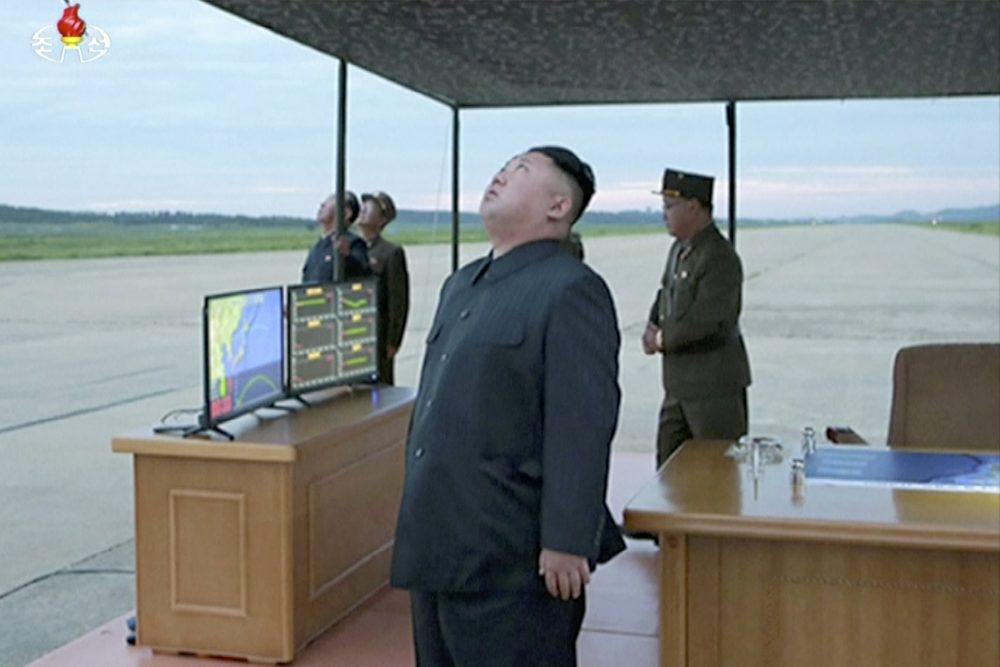Advertisement
The Trump Approach To North Korea's Nuclear Threat
Resume
This week on Freak Out And Carry On, after North Korea conducted its sixth nuclear test, Ron Suskind and Heather Cox Richardson talk with Sheila Smith, a senior fellow at the Council on Foreign Relations. They discussed possible options for President Trump and look back at almost a century of nuclear power around the world.
Excerpts
Ron Suskind: Over the weekend North Korea tested its sixth nuclear bomb. They claim it was a hydrogen bomb. The brutal and secretive regime of Kim Jong-un, the 33-year-old Supreme Leader of North Korea, has threatened to bomb the United States and its territories. As part of his response, President Trump tweets that South Korea has engaged in appeasement, that China should cut off all economic ties to North Korea. We are in the thick now of a full-fledged foreign engagement with maybe disastrous consequences.
Heather Cox Richardson: It's deeply troubling because it's the kind of dominance politics, that as long as you bully everybody else into doing what you want them to do, that you're going to win. That might be possible in a family-held business. It's not possible when you have a global audience. And I keep coming back to the idea that president Trump is not a politician, he's a salesman for the Trump brand. But there's a reason that we have had very complicated and intelligent diplomacy since World War II, precisely to prevent something like this from happening. And the idea that we have gutted that and turned this into two men sort of shouting at each other, especially over Twitter an in press releases, is a really so frightening state of affairs.
Sheila Smith: I think all of us here in Washington D.C., in the think tank world, were quite aware that no matter who was elected last November one of their first diplomatic crises or strategic crises would be with North Korea. The North Koreans have a habit of testing our new presidents. Barack Obama was tested. George Bush was tested. And Bill Clinton, of course, was there when the North Koreans walked away from their commitment to not pursue a nuclear arsenal back in 1994. It was the Clinton administration that first had to consider whether or not there was a preemptive option, whether or not we would, could or should think about using military force to forestall the place that we're in today. And of course the decision making at that time was no it was not the right answer.
Suskind: What should President Trump do?
Smith: First of all you should stop tweeting. Second, you have a very competent spokesperson in Secretary of Defense Mattis and you have a very responsible military. You have very good generals. They are measured and they understand the situation. The other thing is you have a very good friend in Shinzo Abe, Japan's prime minister and you could possibly have a good friend in President Moon Jae-in in South Korea if you just give him a little chance. But your allies are your best asset.
Richardson: Well, the central question is how you bring a rogue state or a compromised state into communication with the rest of the world. There are many ways to think about that and about who drives those kinds of conversations: is it people at the bottom? Is it the leadership? But one of my favorite stories about this is when Vice President Nixon, in 1959, met with Soviet Premier Nikita Khrushchev in what became known as the kitchen debates, which were part of a cultural exchange in which an American house was exhibited in Moscow. It's a fascinating set of talks because Khrushchev is trying to debate philosophies and how important communism is. Then Nixon is literally saying stuff like, here's a refrigerator. It saves lots of time. That's not a direct quote, but every time Khrushchev says, look at the principles that we're living under so that we can keep our state strong and take over the world. Nixon is like, wouldn't you like to spend less time in the kitchen? It was a really interesting sort of material discussion about the ideologies of different political systems. But the bottom line is lots of people looked at that and said, yeah, I want a toaster and a refrigerator. Maybe Communism isn't so great, maybe capitalism is it. an end when you think about North Korea. When you think about North Korea, one of the things that seems to me that makes the regime stand as firmly as it does is that its people don't have the kind of access to outside information. And that maybe the answer is that kind of soft power that is harder and harder to keep away from people nowadays.
Smith: The Chinese have largely taken that approach with North Korea. They've begun with Kim Jong-il, the current Kim's father. China did try to work on an economic opening. Let's show them that you can have market reforms but still be a good socialist state or believe in the ideology of self-reliance. There's a new book out that I've just ordered from Amazon that looks at the North Korean economy and basically makes the case that 70 to 80 percent of the North Korean economy today could be described as as a market economy. So the Chinese role here has been very important in that economic overtures. Those of us sitting in Washington want China to use economic leverage now to sanction the North Korean behavior and China's been very resistant. Why are they so resistant? For years and years of meeting informally with Chinese academics and Chinese government officials there's a fairly steady refrain that they really don't have that much influence over Pyongyang. That's one. The second, I think, is that the Chinese do have a different strategic read of their interests. They see the division of north south as not necessarily a bad thing for Chinese security. They see the North as a buffer against a South Korea that has American troops and weapons on the ground. They see a unified Korea with American troops on the ground might not be there in their best interests. Strategically, over the long game, China may not be as uncomfortable with some of the events that we've been witnessing. But they want to make sure that this doesn't get out of hand. Noth Moscow and Beijing signed on to a U.N. Security Council sanctions after that missile test flew into Japanese airspace. They signed on to sanctions that said that they would put an embargo on trade. Every major war has not always started because people want to go to war with each other. It's often started exactly the way we are experiencing these interactions today: rhetorical escalation, military's getting mobilized, military power being demonstrated, and no real key of how to get a hold of the process or how to stop the dynamic. So I think they're worried and I think they should be. I think our allies are worried. I think people here in D.C. are worried.
Richardson: I think you can argue that every war starts with a lot of posturing and then somebody makes the wrong move, somebody pulls the trigger at the wrong moment. When we think about coming to the brink of nuclear war everybody looks at the Cuban missile crisis but the one that is of more interest to me happened on November 9th 1979. Technicians at NORAD, in Colorado, believed from their computer read out that the USSR had launched a full nuclear strike on America. When that happened they called the National Security Adviser Zbigniew Brzezinski, who worked for President Jimmy Carter at the time, and he realized he had to relay that information to the president and the president would have three to seven minutes to respond. But it was too late and the world was going to end. He had to make the call of what he was going to do. And as he was thinking about calling President Carter he got another phone call saying that the readings had been wrong and there had not been a full nuclear launch. But what I find most poignant about that moment is that while he was sitting there at 3:00 in the morning thinking the world was going to end he didn't wake up his wife. He wanted her to die in her sleep. And when you come down to all of these nuclear events, the bottom line is that humans want to walk away from that brink. They might pound their chests and insist that they're going to do the unthinkable but that most human beings would not wake up their wives. They would not want this to happen to the people that they love. And I keep hoping that even though we seem to be tripping toward disaster, that at the end of the day we want to take care of the people in the bed next to us.
The views and opinions expressed in this podcast are solely those of the participants and do not in any way reflect the views of WBUR management or its employees.
